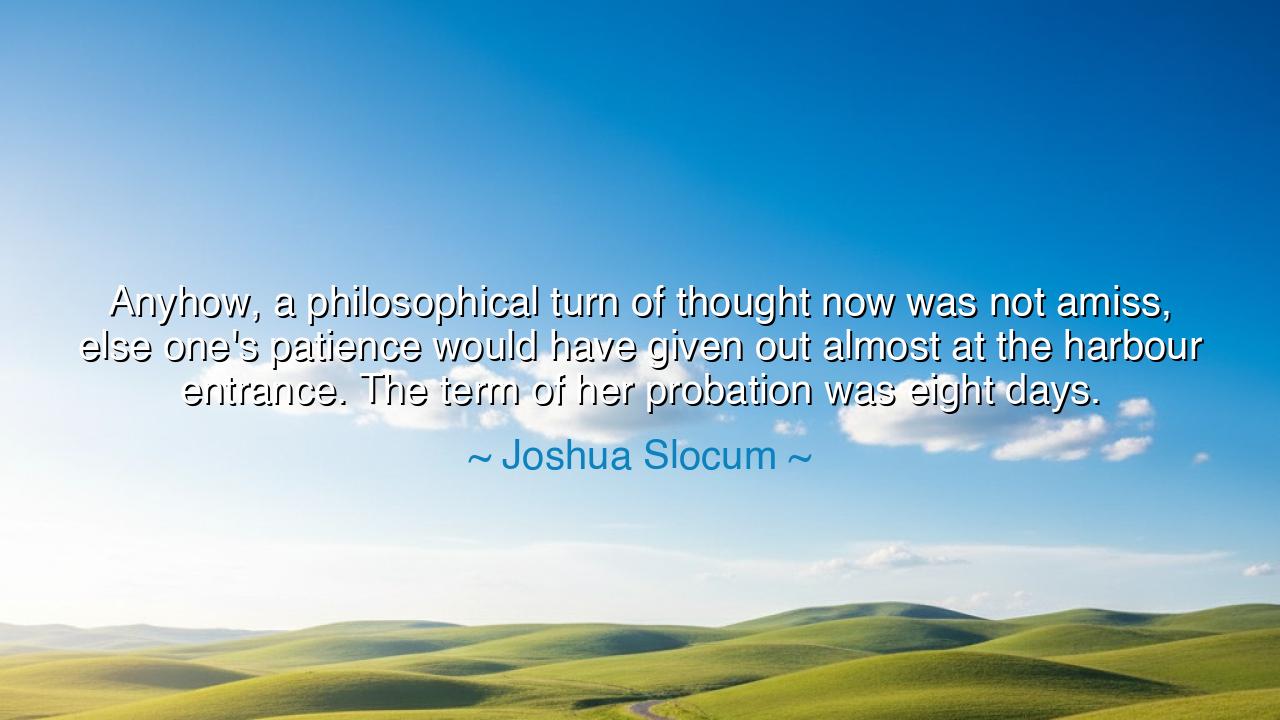
Anyhow, a philosophical turn of thought now was not amiss, else
Anyhow, a philosophical turn of thought now was not amiss, else one's patience would have given out almost at the harbour entrance. The term of her probation was eight days.






Hear, O lovers of the sea and of the spirit, the words of Joshua Slocum, the first to circle the globe alone by sail, who wrote with quiet humor and iron resolve: “Anyhow, a philosophical turn of thought now was not amiss, else one's patience would have given out almost at the harbour entrance. The term of her probation was eight days.” In this reflection, we see not merely a sailor at anchor, but a man enduring the eternal trial of waiting, learning that the harbor is not only a place of arrival, but also a place of testing.
For Slocum speaks of his vessel, the Spray, and of the trials she gave him before granting safe passage. He calls it a “probation,” as though the ship herself were testing the worthiness of her captain. Patience was demanded, not only in the vast oceans but even at the very gates of safety—the harbor itself. Here is the paradox of life: often, the hardest waiting comes just before the end, when we can almost see the shore. Without a philosophical turn of thought, without the wisdom to reframe the trial, despair would seize the heart and undo the victory that was so near.
Consider, O listener, the Hebrews wandering in the desert forty years. Their promised land lay before them, yet their greatest trials came not at the beginning, but near the end, when impatience and doubt gnawed at their spirits. Many faltered because they could not endure the last stretch of waiting. So too did Slocum recognize that patience must be renewed at the threshold, lest one lose heart at the harbor’s entrance, when the goal is already within sight.
The mention of eight days reminds us that endurance is not endless suffering, but trial within a season. Every probation has its length; every test has its measure. The sea did not test him forever, nor does life. Yet in the midst of those days, each hour can feel as heavy as iron. To endure them requires not mere willpower but philosophy: the ability to step back, to laugh at hardship, to clothe trial with meaning. For the one who can transform frustration into reflection is never defeated, even when delayed.
Slocum’s insight reaches beyond the deck of his ship. In every endeavor—be it in study, in love, in craft, or in faith—there comes a probationary season, when progress seems halted, when patience runs thin. The temptation is to despair, to give up at the very threshold of success. But he teaches that the soul must find strength in a philosophical turn of thought—whether through gratitude, perspective, or a sense of humor. It is the mind that transforms trial into training, delay into discipline.
What lesson, then, shall we draw? That patience is not passive waiting, but active endurance. It is a choice to hold steady when the heart trembles, to keep faith when the harbor is near but not yet granted. Slocum, in his lone voyage, shows us that patience must be married to philosophy, lest it dissolve into bitterness. To survive the “eight days” of our probation, we must anchor our minds in meaning, seeing hardship not as punishment but as preparation.
Therefore, O seeker, let Slocum’s words be your compass: when your patience falters at the threshold of triumph, lift your mind to philosophy. Remember that every trial has its term, every delay its end. Do not surrender when the harbor is in sight. For often, the greatest victories are won not on the open sea, but in the quiet endurance of waiting just before the shore. And when at last the anchor drops, you will know that your patience has not been wasted, but forged into wisdom eternal.






AAdministratorAdministrator
Welcome, honored guests. Please leave a comment, we will respond soon